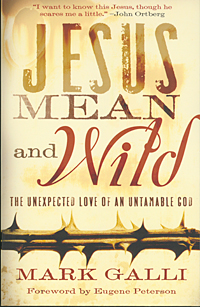In his book with the provocative title, “Jesus Mean and Wild,” Mark Galli provides a portrait of Jesus whose personality has its sharp edges.
 Don Kirkland
Don KirklandHis book, published in 2006 and released in paperback this year, does not completely destroy the image of Jesus as meek and mild, as suggested by the Wesley hymn we grew up singing. It does, however – based on the gospel account of Mark – make it clear that at times our Lord was neither meek nor mild.
Galli, the senior managing editor of Christianity Today magazine, notes in his introduction that Jesus “sternly charges” or “strictly orders” people he heals, regards religious leaders with “anger” and grief,” destroys a herd of swine while showing no regret and providing no compensation to the owner, is “indignant” with his disciples, describes his generation as “faithless” and overturns the tables of the money changers in the temple in a moment of rage – and there are more.
“Nearly everywhere we turn, in the gospel of Mark for example, we find a Jesus who storms in and out of people’s lives, making implicit or explicit demands and, in general, making people feel mighty uncomfortable,” Galli writes.

Galli, who is the author or co-author of several books, including “131 Christians Everyone Should Know” and “Beyond Smells and Bells,” says outright that this 207-page book, which contains a guide for group discussions, does not aim at being either interpretative or theological in nature, though he relied on a number of modern Bible commentaries.
“This is merely one man’s attempt to understand theologically and pastorally what in the world Jesus was up to when he acted so mean and wild,” he says in the introduction.
Galli says that it was “The Cost of Discipleship” by the German theologian and martyr Dietrich Bonhoeffer that greatly influenced his thinking about our Lord. “The Jesus he painted in that classic suggested to me that Jesus was more intimidating and attractive than I had imagined.”
In the book’s foreword, Eugene Peterson, the classical scholar who gave us the lively translation of the Bible called “The Message,” finds Galli’s book especially appealing and even necessary in a free-market economy where everyone is more or less free to “fashion and then market whatever sells” – including Jesus.
“When evangelism is retooled as recruitment,” Peterson writes, “then marketing strategies for making Jesus more attractive to a consumer spirituality begin to proliferate. Words or aspects of Jesus that carry unwelcome connotations are suppressed. We emasculate Jesus. Every omitted detail of Jesus, so carefully conveyed to us by the gospel writers, reduces Jesus. We need the whole Jesus. The complete Jesus. Everything he said. Every detail of what he did.”
By design, Galli’s book has a devotional quality to it. The Christianity Today editor encourages believers to “read, study and inwardly digest the gospels, where the mean and wild Jesus roams. There you will find, especially in the darkest and most forbidding passages, the very splendor and richness of God’s love.”
John Ortberg of the Menlo Park Presbyterian Church praises Galli’s book for its portrayal of Jesus who is “unleashed, untamed, undomesticated and unpredictable” and concludes, “I want to know this Jesus, though he scares me a little.”
So do I. And yes he does. More than a little.